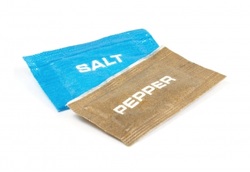Salty foods speed up the aging process in overweight teenagers, according to a new study assessing lifestyle factors and telomere length.
Telomeres are the protective ends on chromosomes – kind of like the little plastic part at the end of your shoelaces. They protect the chromosome from coming “undone.” For years, scientists believed the “aging” process was related to these telomeres gradually getting shorter and shorter. Essentially, the shorter your telomere, the less it protects your chromosomes, the “older” your body seems.
Previous research found that smoking, lack of physical activity, and high body fat are some of the lifestyle factors that shorten telomeres and speed up the aging process. New research from the Medical College of Georgia finds high-sodium intake in overweight teenagers also shortens telomere length. Even more interesting, telomeres were not affected in normal weight teens with high-sodium intake.
Researchers suspect the inflammation created from obesity makes the body more sensitive to sodium intake and speeds up the telomere shortening. “High sodium intake and obesity may act synergistically to accelerate cellular aging,” according to lead author, Dr. Haidong Zhu.
Considering the majority of sodium intake comes from processed foods, the quality of our diet should be assessed immediately. The American Heart Association recommends only about 1500 mg/day of sodium – about 2/3 teaspoon of salt. Consider this, out of 766 people participating in the study, the lowest reported sodium intake group averaged about 2388 mg/day and the highest intake group averaged 4142 mg/day!
If a food is wrapped in plastic or surrounded by a box, it’s probably made with salt. All teenagers, especially those who are overweight, should focus on eating fresh, unprocessed foods as the first step in a healthy lifestyle. That way, we can keep our shoelaces – I mean – our chromosomes, healthy!


Recent Comments